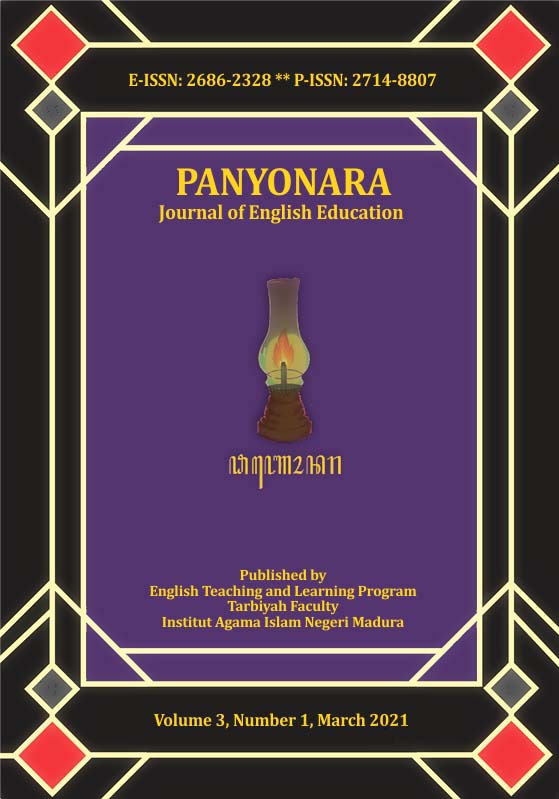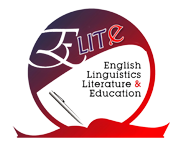The Practices and Obstacles of English Language Teaching in Intellectual Disability Classroom: A Case Study at Special School (SLB) in Palembang
 Abstract views: 1013
,
Abstract views: 1013
,
 PDF downloads: 877
PDF downloads: 877
Abstract
Individuals with disabilities learn with difficulties such as physical, emotional, mental, and social deficiencies. In a limited physical and mental condition, they are faced with problems in learning, particularly in learning English. This study aims at revealing practices and obstacles in learning English in an intellectual disability classroom that affected the teaching practices. A case study method was used in this study. This study's participants were two teachers at SLB-C Tuna Grahita Palembang selected by a typical sampling technique. The observation and interview were used to collect data regarding realized practices and obstacles in teaching English to students with intellectual disabilities. Data were analyzed using thematic analysis. The study results indicated that English language teaching practices in intellectual disability classrooms were similar to the regular ones but more oriented to students' needs. The obstacles of English language teaching were affected by intellectual disability students' limitations in writing, reading, speaking, listening skills, and heterogeneous ability.
Downloads
References
American Psychiatric Association (APA). (2013). Diagnostic and Statistical Manual of Mental Disorders (5th ed.). Philadelphia: American Psychiatric Association.
Arifah, I. (2014). Pelaksanaan Pembelajaran bagi Siswa Tuna Grahita di Kelas 5 SD Gunungdani, Pengasih, Kulon Progo [Skripsi, Universitas Negeri Yogyakarta]. https://eprints.uny.ac.id/14328
Association for Higher Education Access & Disability (AHEAD). (2011). Teaching and Learning: Making Learning Accessible for Students with Disabilities in Further Education. AHEAD Educational Press.
Avianita, Asib, A., & Drajati, N. A. (2018). The Strategy in Teaching English Vocabulary for Students with Special Needs: A Narrative Inquiry Study. Journal of Education and Human Development, 7(2), 66–70.
Bawa, A.-H., & Osei, M. (2018). English Language Education And Children With Intellectual Disabilities. International Journal of Development and Sustainability, 5(11), 2704–2715.
Darma, I. P., & Rusyidi, B. (2015). Pelaksanaan Sekolah Inklusi di Indonesia: Prosiding Penelitian dan Bina Pengabdian Kepada Masyarakat. Vol 2, No 2, 223–227.
Hofman, M. C. C., Terband, H., Snik, A. F. M., & Maassen, B. A. M. (2016). Speech Characteristics and Intelligibility in Adults with Mild and Moderate Intellectual Disabilities. Folia Phoniatr Logop, 68, 175–182.
Hoogeveen, F. R., Smeets, P. M., & Lancioni, G. E. (1989). Teaching Moderately Mentally Retarded Children Basic Reading Skills. Research in Development Disabilities, 10(1), 1–18.
Iqbal, M., Baig, M. A., Bhinder, M. A., & Zahoor, M. Y. (2016). Factors Causing Mental Retardation. Asian Journal of Natural and Applied Sciences, 5(3), 28–37.
Kemendikbud. (2016a). Gambaran Sekolah Inklusif di Indonesia: Tinjauan Sekolah Menengah Pertama. Jakarta: Pusat Data dan Statistik Pendidikan dan Kebudayaan.
Kemendikbud. (2016b). Indonesia Educational Statistics in Brief 2015/2016. Jakarta: Pusat Data dan Statistik Pendidikan dan Kebudayaan.
Krapez, S. (2010). Second Language Comprehension And Acquisition In Mentally Disabled Children-Illusion Or Reality. IBS Newsletter Porocevalec. http://porocevalec.ibs.si/en/component/content/article/42-letnik-1-t-3/136-staa-krape-ma-ed-applied-linguistics-second-language-comprehension-and-acquisition-in-mentally-disabled-children-illusion-or-reality
Mosito, C. P., Warnick, A. M., & Esambe, E. E. (2017). Enhancing Reading Abilities of Learners with Intellectual Impairments through Computer Technology. African Journal of Disability, Vol. 6. https://doi.org/10.4102/ajod.v6i0.206.
Nadhiroh, S. (2017). A Study on Teaching and Learning Vocabulary for Disable Students at SLB B Negeri Tulungagung [Skripsi, IAIN Tulungagung]. https://repo.iain-tulungagung.ac.id/6955
Otanjac, M. I. (2016). Students With Language Learning Disabilities and Difficulties In A Foreign Language Classroom. Specijalna Edukacija I Rehabilitacija, 15(4), 461–474.
Rondal, J. A. (2000). Bilingualism In Mental Retardation: Some Prospective Views. Saggi, Child Development and Disabilities, 26(1), 57–64.
Sari, D. A. (2017). Teacher’s Obstacles: Teaching English for Deaf Learners at Seventh Grade of SLB Negeri Surakarta [Skripsi, IAIN Surakarta]. http://eprints.iain-surakarta.ac.id/1279
Schalock, R. L., & Luckasson, R. (2004). American Association on Mental Retardation’s Definition, Classification, and System Supports and its Relation to International Trends and Issues in the Field of Intellectual Disabilities. Journal of Policy and Practice in Intellectual Disabilities, 1(3), 136–146.
Sedlak, R. A., & Sedlak, D. M. (1985). Teaching The Educable Mentally Retarded. New York: SUNY Press.
Shree, A., & Shukla, P. C. (2016). Intellectual Disability: Definition, Classification, Causes and Characteristics. Intellectual Disability: Definition, Classification, Causes And Characteristics, 7(1), 9–20.
Sousa, D. A. (2001). How The Special Needs Brain Learns. Thousand Oaks: Corwin Press.
Tomac, V., Puseljic, S., Skrlec, I., Andelic, M., Kos, M., & Wagner, J. (2017). Etiology and The Genetic Basis of Intellectual Disability In Pediatric And Population. Southeastern European Medical Journal, 1(1), 144–153.
Vasconcelos, M. M. (2004). Mental Retardation. Journal De Pediatria, 80(2), 71–82.
Wong, B. Y. L. (2000). Writing Strategies Instruction for Expository Essays for Adolescents With and Without Learning Disabilities. Topics in Language Disorders, 20(4), 29–44.
Zudeta, E. & Mumpuniarti. (2019). Listening Skill of Mild Intellectual Disability. Advances in Social Science, Education and Humanities Research, 104–108.
The journal uses an Open Access policy under a Creative Commons Attribution-NonCommercial 4.0 International License. Authors who publish with this journal agree to the following terms:
- Authors retain copyright and grant the journal right of first publication with the work simultaneously licensed under a Creative Commons Attribution License that allows others to share the work with an acknowledgment of the work's authorship and initial publication in this journal.
- Authors are able to enter into separate, additional contractual arrangements for the non-exclusive distribution of the journal's published version of the work (e.g., post it to an institutional repository or publish it in a book), with an acknowledgment of its initial publication in this journal.
- Authors are permitted and encouraged to post their work online (e.g., in institutional repositories or on their website) prior to and during the submission process, as it can lead to productive exchanges, as well as earlier and greater citation of published work.
















